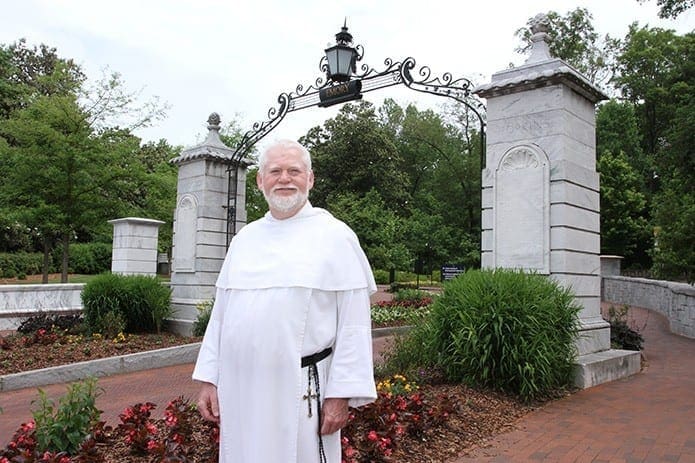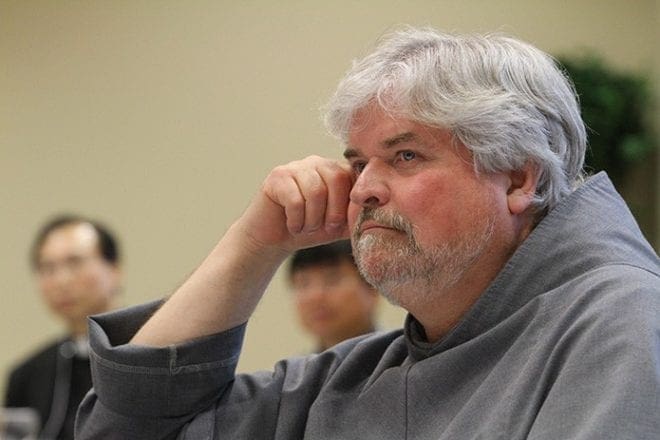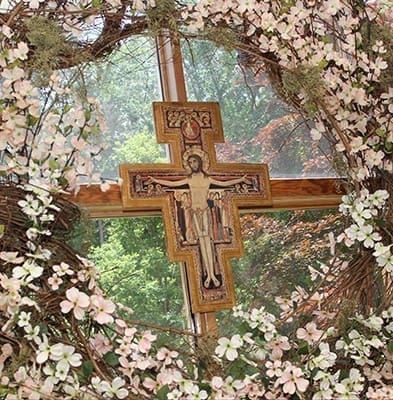 Photo By Michael Alexander
Photo By Michael AlexanderAtlanta
Growing archdiocese draws more religious orders to minister here
By ANDREW NELSON, Staff Writer | Published May 14, 2015
ATLANTA—Father Joe Dorniak greets two youngsters, saying “nice smile and behave” before they scoot along after the midmorning Mass at Holy Cross Church. Moments later, he huddles with a white-haired woman as they bow their heads together in prayer.
Father Dorniak is one of the new staff members at the parish, where the religious order of Conventual Franciscans, known for their gray robes, now serves.
Two archdiocesan Catholic communities since last fall have been placed under the pastoral care of priests from religious orders, one here at the large suburban parish just outside the perimeter and the other at the red brick Catholic Center house at Emory University.
Some 85 members of men’s religious communities serve in the Archdiocese of Atlanta, doing ministries as school chaplains, in parishes and retreat houses.
It is an upswing in their presence. In 2010, there were 67 members of men’s religious communities serving in the archdiocese, according to a yearbook of Catholic statistics.
“It’s a sign of a growing, dynamic archdiocese that religious communities want to come here,” said Bishop David P. Talley, who oversees priest personnel.
Leaders of those religious communities may be drawn to the multi-ethnic and multilingual Catholic presence in the archdiocese, he said.
New religious community embraced by parish
Holy Cross Church began in 1964 under the direction of archdiocesan priests. From 1977 to 1995, members of the Dominican order gave pastoral care to Holy Cross. Then from 1995 to 2014, archdiocesan priests again pastored the parish.
Conventual Franciscans from Our Lady of the Angels Province, which covers the East Coast, lead the ministry now. Father Jude Michael Krill moved here last summer, after serving as the pastor of St. John Vianney Church in Lithia Springs for three years.
“I wish I could clearly define the charism, but it is different,” he said of the Franciscan spirituality and formation. He noted their emphasis on community living, their openness to the arts in liturgy, and collaborative leadership.
He serves at the parish with Father Dorniak and Father Abelardo Huanca Martinez, and they are three of five men living in community as a friary. They will be joined by a Conventual Franciscan serving as chaplain at Blessed Trinity High School in Roswell and a seminarian.
The parish is getting to know them, as they are getting to know the parish. Father Jude Michael likes how parishioners see them as a community, not just individual priests.
“The greatest compliment we get is ‘you guys.’ They look at the fact that the friars are here,” he said.
A longtime parish member said the Franciscans have an enlivening presence. Instead of seating the large overflow crowd at Easter in the parish center, some 200 chairs were moved into the church for everyone to worship together.
Steve Liuzza, a member of the parish Knights of Columbus, said the arts have been introduced to help worship.
“You can make church and religious devotion fun,” he said.
“The reason I embrace them the way I do is because of the way they have embraced the people of the parish,” he said.

Conventual Franciscan Father Jude Michael Krill, pastor of Holy Cross Church, Atlanta, sits in on a March 5 pastoral plan meeting for the Northeast Metro Deanery. Father Krill and two other Franciscan parochial vicars came to the parish in October of last year. Photo By Michael Alexander
Connie Perez has been a member of the parish since 1967. She’s impressed with how friendly the Franciscans have been. “People seem to be happier. All the priests know people’s names. They are always out there (greeting people).”
There has been a learning curve, particularly as people adapt to the importance of Franciscans’ community life. A typical situation is when a parishioner invites a priest to a home meal. Father Krill said the kind invitation often goes against the grain of Franciscan life. The community strives to eat meals together, just as families sit down for a meal, he said. A value Franciscans bring is a witness to community life, he said.
Franciscans in the eastern U.S. province gathered in 2014 for an organizational meeting after two provinces merged and became Our Lady of the Angels. The importance of community living was re-emphasized, so leaders solicited bishops, asking if they had ministries to engage five men living in a friary, he said. Father Krill said Atlanta Archbishop Wilton D. Gregory was one of the first to reply. They arrived at the parish, with its 4,000 registered households, last summer.
Conventual Franciscans aren’t new to the archdiocese. They minister at St. Philip Benizi Church in Jonesboro and serve as chaplains at Our Lady of Mercy High School in Fayetteville and Blessed Trinity. They have staffed St. John Vianney Church, but that will end in July when the parish will be returned to the pastoral care of an archdiocesan priest, said Bishop Talley.
Father Krill’s large office is decorated with trains, wooden sets and paintings. As an American literature professor, he has a fondness for Emily Dickinson and has a painting of the poet’s home hanging on his wall. He grew up in southeast Pennsylvania. He vacationed at the Jersey shore as a kid where he came across basketball-playing Franciscans, a totally different image of priests than he had known.
He was ordained in 1983 and spent more than 20 years in the college classroom.
A mark of a Franciscan ministry would be a collaborative approach to leading the parish, he said.
“As pastor, I never want to make a decision here by myself,” he said. “A good pastor doesn’t always need to be in charge. Collaboration and community building is something all Franciscans bring.”
Also, parishioners will be exposed to the global church. It won’t be uncommon for a friar from a developing country to visit. “They realize what they get is a bigger family than just the few of us here,” the pastor said.
At the same time, the friars (which comes from the Latin word for brothers) have learned more about Holy Cross parish traditions. There is strong support for the poor at the parish, which sustains a food pantry in addition to its St. Vincent de Paul ministry. Each year the community hosts a large fundraiser, producing a major show to support its ministries to the poor. This year, “Footloose” generated some $18,000 in profits, all for the ministries to the poor, said Father Dorniak, a muralist who painted some of the sets. He also is interested in decorating the church’s blank walls more, but only with the parish’s permission.
“They already had a Franciscan heart, they just didn’t know it,” said Father Jude Michael. “God is truly at work here.”
Preaching, but not only with words
The new Emory University chaplain, Father John Boll thinks St. Dominic would approve. For a religious order whose formal name is the “Order of Preachers,” Father Boll believes in preaching by showing up where students hang out.
“You preach by presence. You have to make the connections,” said Father Boll. “Listening to them tells you where to go. Their lives set the agenda of what you preach and teach.”
Father Boll is dressed casually, wearing blue suspenders for a picnic with other Emory campus ministers. Hanging in the corner of his office is the white cassock Dominicans wear. Dominicans are known for preaching, but it isn’t just in words but by attending campus events. With his white beard, he could double as Santa Claus.
“You get out and get in front of people,” he said, from mixing with freshmen at orientation to driving 45 minutes to celebrate Mass for a small group of students. Being a regular face on campus is a goal, as is creating opportunities for Catholics to gather and form community.
Father Boll has worked most of his life, more than 27 years, in the Dominican community on college campuses. A self-described “Trekkie,” on a billboard hangs an autographed picture of actress Kate Mulgrew as Captain Kathryn Janeway, who scribbled with a flourish, “Full thrusters.”
A native of Ohio and one of 11 children, his father had an electrical and refrigerator repair business. He studied biology and chemistry in college. He was active in his campus church where a priest suggested he consider the ministry.
“It wasn’t a matter of what I wanted to do, but what is the gift God has put in my life. It made it more a treasure hunt.”
He is a member of the Dominican Province of St. Martin de Porres, which stretches from Texas to the Deep South. He is one of four Dominicans in St. Augustine House in Atlanta. The order also staffs Our Lady of Lourdes Church, Atlanta. “If we’re going to be in Georgia, we’re going to be in Atlanta,” he said.
It has been nearly 20 years since Dominicans were on the Emory campus. The community began a house of study here, but it converted in 1987 to the Aquinas Center of Theology, an independent nonprofit Catholic center. Dominican priests ministered to Catholic students at the Emory Catholic Center from 1981 to 1995.

As a sign of the Franciscan presence, a San Damiano cross hangs behind the altar in the day chapel at Holy Cross Church in Atlanta. Photo By Michael Alexander
Father Thomas Condon, the Dominican provincial, said the Catholic diversity in Atlanta makes it attractive. Plus, being a major city in the Southeast, it makes sense for the Dominican community to serve here, he said.
“The cultural diversity is important to us. It mirrors the church. It was someplace we always wanted to come back to,” said Father Condon, speaking from his office in New Orleans.
Phillip Thompson, executive director of the Aquinas Center of Theology, said the values of the Dominican order make the community a good fit.
“The four Dominican charisms include prayer, community, study and preaching. This is a wonderful fit for a university like Emory where their preaching and their ability to communicate effectively is so essential to engaging the millennial generation,” he said in an email.
Also, the international Dominicans bring insights welcome in a diverse university, he said. One of the new Dominicans in Atlanta, Brother Minlib Dallh, is an expert on Christian and Muslim relations and taught a course at the Candler School of Theology on Christian and Muslim mysticism.
Michael Zauche, a lay campus minister, said the Dominicans bring stability to the Emory Catholic community. Recent chaplains juggled this duty with other archdiocesan assignments so their time on campus was limited, he said. It will be beneficial for Catholic students to have a full-time chaplain, he said.
Serving Catholics on the campuses of Emory University, Agnes Scott College in Decatur and 35 miles away at Emory Oxford College, Father Boll is organizing weekly Mass on each campus. Some 200 usually attend Sunday Mass, filling Emory University’s Cannon Chapel. The other campuses have about a dozen Catholics at Mass.
Catholics are drawn to the Eucharist, so a regular Mass attracts students, he said. He is also exploring online programs to help students engage with the faith.
Father Boll enjoys the intellectual pursuit of faith, especially for college-age Catholics. He spurs college students to move from a child’s faith to an adult faith, just as they are furthering their expertise in advanced areas of study.
College students are part of the millennial generation, which has an interest in spirituality but less in organized religion, according to many surveys. In response, Father Boll said his and the center’s effort is to use that interest to encourage students to explore sacredness at a deep level.
“There is a pervasive interest in spirituality. It’s easier now than in the 1980s. I see it as an opportunity of evangelization,” he said.
“It is the time to encourage people to face their doubts and their questions. My favorite thing is the question and answers with students. The truth is there if you are interested in pursuing it.”